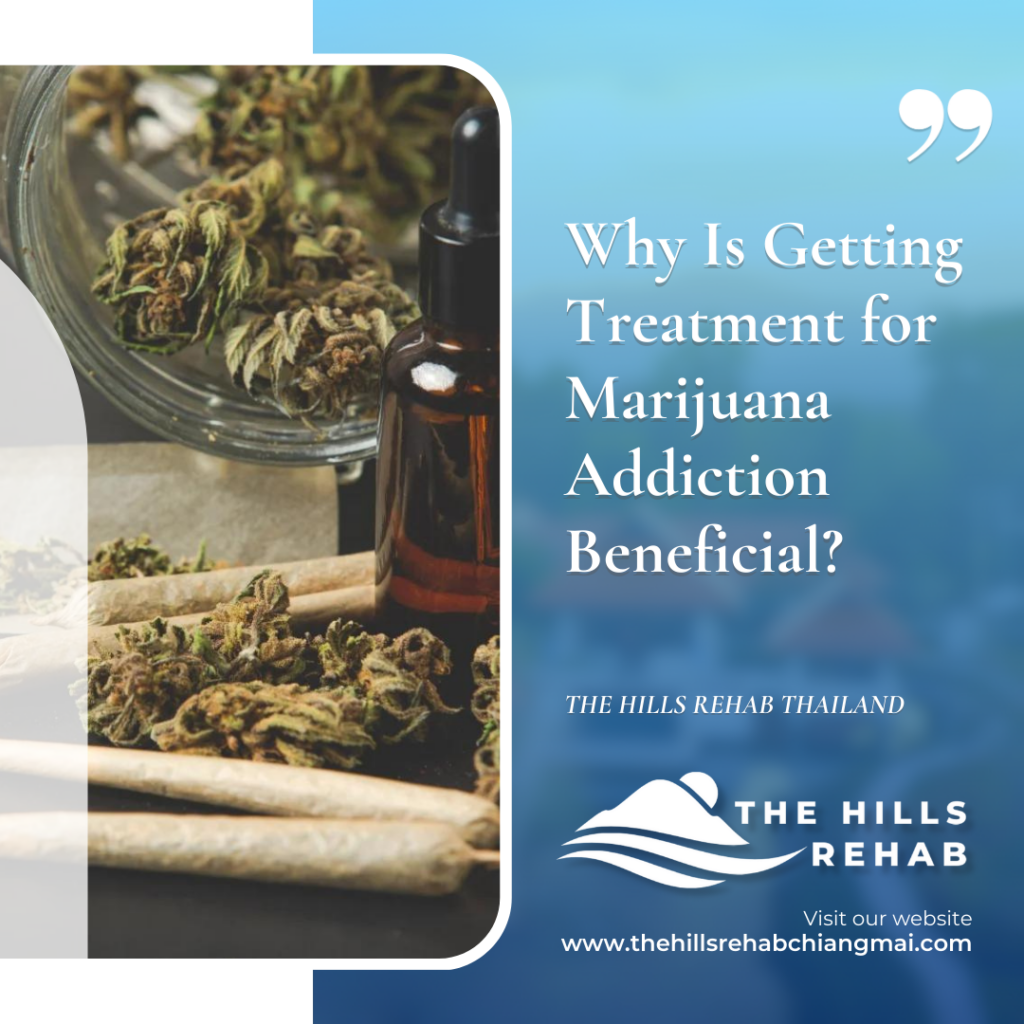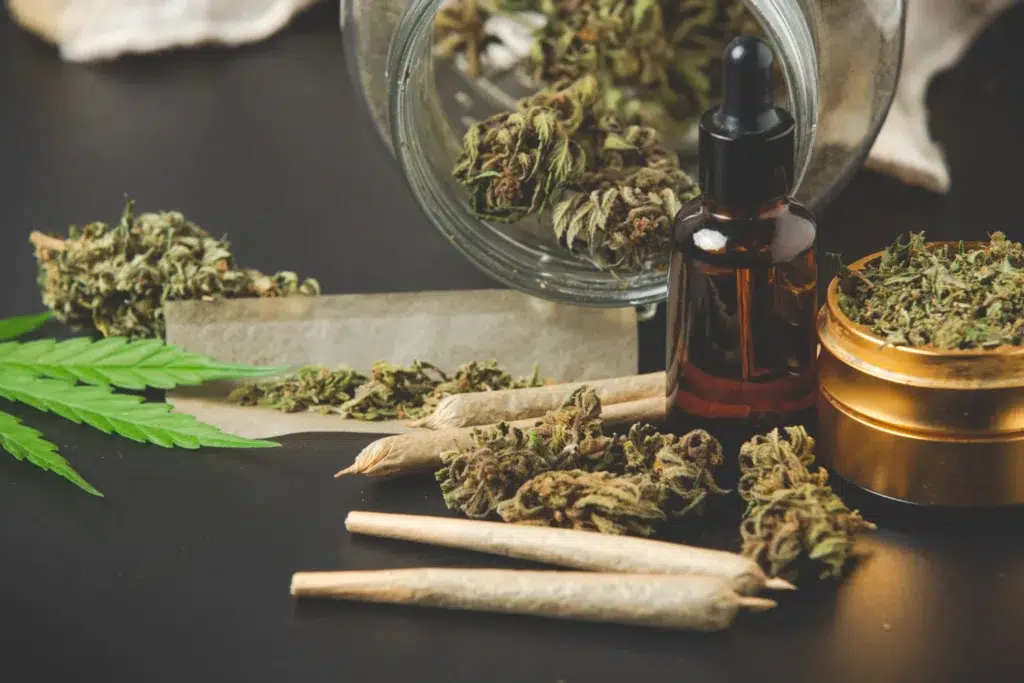
Why Is Getting Treatment for Marijuana Addiction Beneficial ? : If you are considering The Hills Rehab in Thailand, it offers a serene and supportive environment conducive to recovery. The center likely provides personalized treatment plans, experienced medical and therapeutic staff, and a holistic approach to healing, including physical, mental, and emotional health.

Marijuana According to a recent statistical study, more people are becoming addicted to marijuana in various regions of the world as the quality and potency of tetrahydrocannabinol (THC) rise. THC is the component of the marijuana plant that gives the user the euphoric feeling or high.
Higher-potency marijuana users are more likely to develop addiction and mental health consequences compared to those who use lower-potency products which is usually 5 to 10 milligrams per gramme of THC.
According to the US Centers for Disease and Prevention, roughly 3 out of every 10 marijuana users in the US suffer from marijuana use disorder, which is a medical name for marijuana addiction. According to government statistics issued last year, marijuana is the most widely used substance in Britain, with almost 2.1 million adults taking it on a regular basis.
Over the past ten years, more people have sought treatment for marijuana addiction, according to the European Monitoring Centre for Drugs and Drug Addiction and a survey by the United Nations indicated that in the past two decades, the proportion of people seeking treatment for marijuana addiction has increased all over the world with the exception of Africa.
And yet, many people use marijuana without considering the ramifications such as marijuana addiction, adverse effects on mental health, and other negative impacts on the body.
Treatment for marijuana addiction might benefit you or a loved one in a variety of ways. The sufferer of marijuana addiction receiving treatment for marijuana addiction will be able to learn about the negative effects of the drug, how to avoid it and triggers in the future, and what resources are available to support them during their recovery.
It is critical to get help right away if you or someone close to you struggles with marijuana use. You can find the tools and support you need for the arduous path to sobriety through a variety of inpatient programmes such as the bespoke marijuana addiction treatment program at The Hills Rehab Chiang Mai.
Addiction to marijuana is classified as a type of substance misuse. When a heavy marijuana user quickly stops using the substance, they experience withdrawal symptoms. They then feel demotivated to stop and continue to utilise the drug.
Typically, marijuana is smoked in a joint, also known as a cigarette. It can also be used in a variety of other ways that are deemed recreational drug usage rather than how medical marijuana is administered. The following are a few ways marijuana users take the drug
This can be done either with a rolled cigarette or a pipe or bong that filters the smoke via water. The size of a pipe, blubbers are also widely used. Marijuana users may become innovative and make bongs out of virtually anything, including fruit and soda bottles. The consequences are multiplied because the smoke from the burning agents is also carcinogenic. Plastic bottles, milk jugs, buckets, and two-liter soda bottles are used to make gravity, bucket, or waterfall bongs, which use water, or occasionally beer or wine, to pull smoke into the chamber.
This electronic device warms the marijuana to a temperature that is just below the point of combustion in this relatively new mode of marijuana consumption. Inhaling the active components as vapour instead of the cancer-causing smoke results in a higher high without the recognisable smell of marijuana, and the vaporizers are small and simple to carry as well as hide.
Using tetrahydrocannabinol (THC) resins in the form of oil (hash oil or honey oil), a soft solid (wax or budder), or a hard solid is similar to vaping but differs in that it employs THC resins (shatter). A glass bong or pipe is heated with a blowtorch to produce a vapour that produces a higher high than consuming marijuana traditionally.
Home-baked marijuana brownies or cookies have been popular for decades, but marijuana is now cooked into a variety of foods that are referred to as marijuana edibles. Marijuana-infused foods include sweets like cakes, cookies, gummy bears, cereal, granola bars, and even chewing gum. Marijuana oil additives are also becoming more widely available in teas, sodas, and even beers. The delayed start of the substance’s effects is a common cause of overdose because people believe that ingesting it is less hazardous.
To counteract the negative effects of smoking, THC or cannabidiol (CBD) are infused into liquids to create sprays that users can apply sublingually. Where marijuana is still prohibited, this method is applied because the plants are hard to find. Some users combine the use of joints and blunts by misting variously flavoured infusions on them.
These liquid tinctures are made from oils of the marijuana plants that have been extracted, and a few drops are placed beneath the tongue to fast enter the bloodstream. They are occasionally infused with alcohol or alcohol and water. This method of marijuana consumption is primarily used for medical purposes and is extremely concentrated, highly strong, and fast-acting. Because of the potent high it produces; recreational marijuana users frequently abuse it.
Topical marijuana oils are applied topically to the skin to reduce muscle pain and soreness through absorption. These oils are thicker than those used in edible goods. They often just serve therapeutic purposes and do not get the user high.
Marijuana addiction is a significant issue both in the US, UK, Australia and around the world. Many marijuana addiction sufferers seem unable to break free of the pattern of use without support from professionals. The following list includes indications or signs of marijuana abuse:
Fighting a marijuana addiction can be challenging. There are many causes for this addiction, and these are frequently related to the person struggling with marijuana abuse’s personality or mental health. Some users, such as those with a family history of drug usage, may be more prone to addiction than others. The symptoms of marijuana addiction include:
A person who has been using for a time will often experience withdrawal symptoms after they stop using. Seizures, depression, sleeplessness, and other serious sleep disturbances are among these symptoms.
The short-term effects of marijuana use include confusion and disorientation as well as distorted perceptions, time distortion (a feeling that time is moving more slowly), confusion, and disorientation. Treatment for marijuana addiction even in short term use might be beneficial by offering counselling, therapy, and support groups to avoid it becoming a an addiction situation.
Marijuana addiction can develop over time. The National Institute on Drug Abuse in the US, estimates that 9% of people who try marijuana develop an addiction to it. Because marijuana alters the levels of the brain’s dopamine levels, which regulates both emotion and movement, it is deemed to result in addictive. Also, according to the National Institute on Drug Abuse, marijuana use may increase a person’s risk of developing anxiety or depression.
Some people develop an addiction to marijuana. The most prevalent addiction to marijuana is not physical, but psychological. Addiction is caused by the euphoric high or “high” state. This feeling of being high may be brought on by marijuana’s ingredients or by a person’s anticipation of what they believe smoking would do to them.
The THC in marijuana can be detected in the user’s blood, saliva, or urine. A hair follicle test can also be done to find marijuana use evidence. These tests are all carried out with advanced machinery that can find THC, the addictive component of marijuana. Loss of weight, burns on the lips or fingertips, and a lack of motivation are some ostensible indications of marijuana usage.
Physical dependence might make marijuana addiction withdrawal symptoms unbearable that avoidance to get treatment an issue. This means that someone who has smoked marijuana for a long time has a tolerance to the effects of the drug and has to continue using it in order to avoid the uncomfortable withdrawal symptoms. A majority of individuals undergoing therapy have mentioned experiencing marijuana withdrawal symptoms. Anxiety, irritability, depression, restlessness, interrupted sleep, G-I symptoms, and decreased appetite are the major withdrawal symptoms from marijuana dependence. Most withdrawal symptoms start to fade after a few weeks of abstinence.
One or more psychiatric drugs may be used as part of marijuana addiction treatment to help with withdrawal symptoms. Buproprion, which is used professionally as an antidepressant and for quitting smoking, nefazodone, an antidepressant that blocks post-synaptic 5HT-2a receptors and inhibits pre-synaptic 5HT and NE reuptake, and divalproex, an anticonvulsant and mood stabiliser are typically administered.
Marijuana addiction treatment can be carried out in a private setting, making it easier for those struggling to maintain their anonymity and concentrate on their recovery. For many who struggle with addiction, using drugs or alcohol is frequently a cause of shame and embarrassment. To avoid worrying about being judged or feeling ashamed, it can be beneficial to seek out addiction treatment, such as marijuana addiction treatment in a private residential setting. Individualized approaches to marijuana addiction therapy are provided by luxury private rehabs like The Hills, which can benefit people who are battling this addiction. Our knowledgeable staff is available to help if you or a loved one would want more information about our addiction treatment programmes or your choices. Simply contact us anytime to discover our custom-tailored marijuana addiction programs and begin a life free of marijuana dependence.
Are you in need of assistance on your journey to recovery? Contact us. We are here to help. At our reputable rehab center, we offer a complimentary consultation to provide guidance and support tailored to your specific needs.
"*" indicates required fields
TH:
USA/CAN:
UK:
AUS:
Whatsapp: